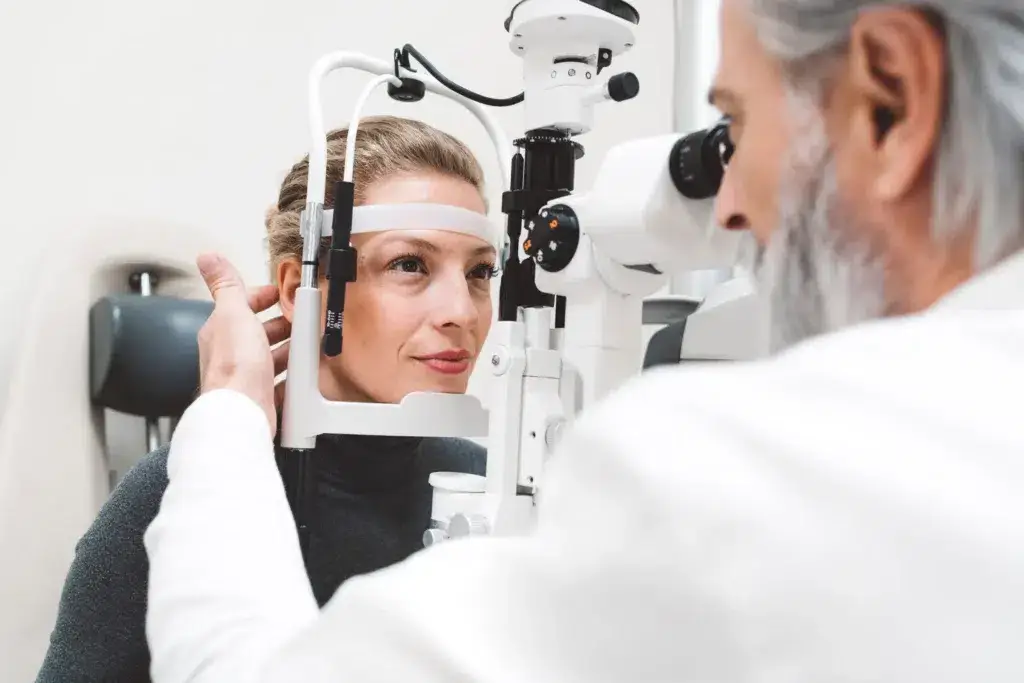
19 Aug What Does an Ophthalmologist Do?
Ophthalmologists are medical doctors who specialize in comprehensive eye and vision care. These highly trained professionals complete four years of medical school followed by a four-year ophthalmology residency, making them uniquely qualified to diagnose, treat, and perform surgery for conditions affecting the eyes and visual system. Understanding what ophthalmologists do can help you make informed decisions about your eye care and know when to seek specialized treatment.
Examining Your Eyes
Ophthalmologists perform detailed eye exams that go beyond basic vision tests. They check visual acuity, measure eye pressure, examine the retina and optic nerve, and assess eye movement and coordination. Using specialized tools like slit lamps, ophthalmoscopes, and tonometers, they evaluate both the front and back of your eyes.
These exams help detect early signs of eye diseases, even before symptoms appear. Ophthalmologists can spot changes in eye structure, blood vessels, and tissue health that may signal potential issues. This thorough evaluation allows for accurate diagnosis and effective treatment planning. Adults should undergo comprehensive eye examinations every one to two years, or more frequently if they have risk factors such as diabetes, a family history of eye disease, or a history of previous eye problems.
Diagnosing Eye Conditions
Ophthalmologists diagnose a wide range of eye conditions through clinical examination and specialized testing. Common conditions they identify include:
- Glaucoma and elevated eye pressure
- Diabetic retinopathy and other retinal diseases
- Macular degeneration and central vision problems
- Cataracts and lens opacity
- Corneal disorders and infections
- Eye muscle problems and misalignment
- Inflammatory conditions affecting the eye
- Tumors and growths in or around the eyes
Treating Eye Diseases
Ophthalmologists provide medical treatment for various eye conditions using prescription medications, injections, and laser therapies. They prescribe eye drops, oral medications, and topical treatments to manage conditions such as glaucoma, dry eye syndrome, and inflammatory disorders. Many ophthalmologists also perform laser procedures to treat diabetic retinopathy, seal retinal tears, or reduce eye pressure in patients with glaucoma.
Treatment plans are individualized based on the specific condition, its severity, and the patient’s overall health status. Ophthalmologists monitor treatment effectiveness through regular follow-up appointments and adjust medications or procedures as needed. They work closely with patients to provide proper medication administration and compliance with treatment protocols.
Performing Eye Surgeries
Ophthalmologists are trained to perform various surgical procedures to restore or preserve vision. Common surgeries they perform include:
- Cataract surgery to remove clouded lenses
- Retinal surgery for detachments and tears
- Glaucoma surgery to reduce eye pressure
- Corneal transplantation for damaged corneas
- LASIK and other refractive surgeries
- Eyelid surgery for functional or cosmetic concerns
- Surgery to repair eye injuries and trauma
- Procedures to treat eye muscle disorders
Consult Ophthalmologists Today
Regular consultations with ophthalmologists are beneficial for maintaining healthy vision, as many eye conditions develop gradually without obvious symptoms, making early detection and treatment beneficial. If you experience sudden changes in vision, eye pain, flashing lights, or other concerning symptoms, it’s helpful to seek care from an ophthalmologist. These specialists provide the expertise needed to preserve your vision and manage complex eye conditions that go beyond routine examinations.

No Comments